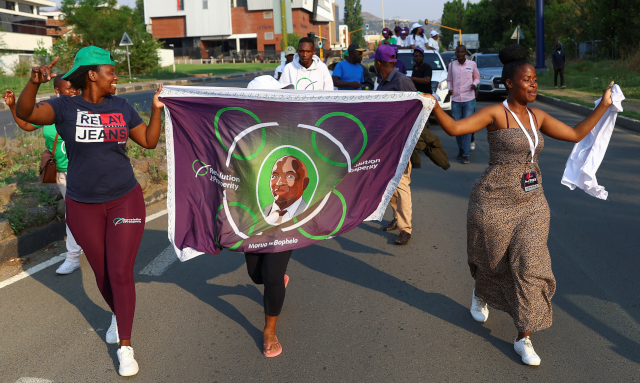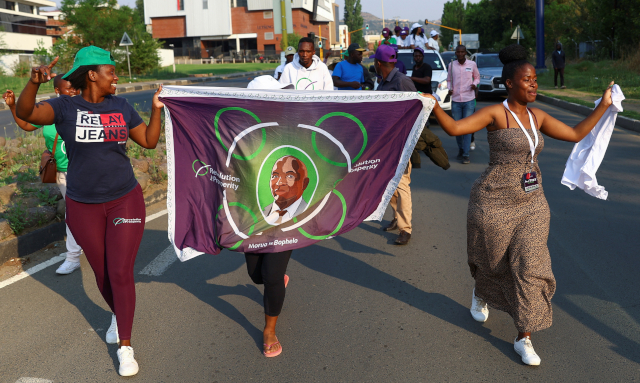2023-3-30

On October 10th, 2022, the Revolution for Prosperity Party (RFP) won the most seats in the Lesotho’s Kingdom Parliament, 57. The party’s philosophy is presented as “social liberalism”, and its motto is “the economy is life”. Considered populist, as conveyed in various media, it was able to achieve the highest simple majority of Parliament seats since 2007.

IMAGE RFP Creator-SIPHIWE SIBEKO. Credit-REUTERS. Copyright-SIPHIWE SIBEKO
With self-made businessman Sam Matekane as its main leader, who had already gained fame and wealth from his skill as a transport and diamond mining entrepreneur, the Party was created in March 2022. Then, its leader was seen as almost a hero due to his philanthropic position during the pandemic – “together… we had to try to save the nation”, as he explained shortly afterwards: “If this nation dies from this pandemic, we won’t have any consumers tomorrow” – thoughts well in line with his Party’s future motto.
To what extend are Lesotho’s parties characterized as “populist”? Is it possible to analyze them within the same conceptual framework used for current European cases? What political, economic, and social conditions have influenced the political and electoral behavior of Lesotho’s citizens? Are these cases structurally or symbolically different from current European ones? Based on a minimalist conceptualization of populist phenomenon proposed by Mudde and Kaltwasser, Lesotho’s case seems to differ from common local and regional characteristics, whilst simultaneously absorbing certain populist patterns from the Global North.
Historically, populism’s emergence was linked to movements and parties that aimed at the extension of rights. On one hand, for Latin America and other regions from the world’s periphery, as Dussel reminds us, it represented a successful form of struggle against an identified hegemonic power in the 20th Century. On the other hand, Mudde and Kaltwasser argue that populism “always entails both exclusionary and inclusive features” and “revisiting” the concept to allow for its comparability, they analyze “three dimensions of inclusion/exclusion: material, symbolic and political”. In this article, only the material dimension is analyzed.
As the authors explain, both inclusionary and exclusionary approaches regarding the material dimension vary in state policies around resource distribution of both monetary and non-monetary goods (such as jobs, public services, and so on), based on ideologies of economic egalitarianism or economic self-interest. Whilst inclusionary approaches will try to envelop some of the historical context of marginalization under an economic ideology, exclusionary ones will maintain or grant those resources for a specific group, restricting welfare policies, through welfare chauvinism strategies, guided by economic self-interest, as Mudde and Kaltwasser identified in most of the far-right populism cases they analyzed.
The Lesotho populist case reveals a common root of welfare chauvinism, despite differences between most Global North welfare states, where predominantly urban areas and high industrialization define it polices, and those more assistance ones that emerged in Africa. Furthermore, this case seems to contradict the main variant of populism in Africa that, as Nyenhuis and Jager point out, tends to be Marxist-Socialist in ideological orientation, stressing sociopolitical inclusivity and largely deriving electoral support from co-ethnic and urban constituencies.
Notwithstanding, for Resnick, ideological orientation was most common during “a first generation of African populism”. In contemporary cases, as elsewhere, “there is not a clear delineation of populist economic interventions” and ideological discourses must be observed in association with political strategies and social-political performances in “a cumulative conceptual approach”. However, where her approach contributes to the identification of a variety of populisms in Africa, it does not address welfare chauvinism.
The exclusionary populist messages found in the RFP’s rhetoric of “social liberalism” nevertheless reveal that there is welfare chauvinism in Africa and its common root is the exclusionary nature of policies, practices, and discourses under neoliberalism. This rhetoric is used in different contexts as an instrument of selection, exclusion, exploitation, and stigmatization, beyond immigrant-based racism. In this sense, welfare chauvinism undermines both social rights under capitalism and any possibility of solidarity among the working class. Thus, regardless of contexts, welfare chauvinism pits workers against each other: national/immigrant, rural/urban, formal/precarious, employed/unemployed, male/female, old/young.
For instance, over the past 20 years, Lesotho became the highest spender amongst any African countries, with social protection spending representing about 40% of the gross domestic product (GDP), especially related to women, children and disabled beneficiaries, the most vulnerable social groups. Following this disposition, the new RFP leader did not deny this situation directly, but rather, signaled their intention to reform all assistance financial structures to be “more efficient” and “less corrupted” – “I promise that I will spearhead the process to right our country’s historical wrongs and make Lesotho great again.”
Although welfare state policies have progressively improved income and wealth distribution since the beginning of this century, Lesotho “is still one of the top 20% most unequal countries in the world”, and despite improvements on reducing inequality, “Poverty remains highly concentrated in rural areas where four out of five of poor citizens live”. Gender inequality has not changed during the last two decades; women’s poverty has grown slightly and reports on institutional and gender-based violence indicate that 86% of women experience violence during their lifetimes. When economic and political improvements do not change social injustice contexts, it is correlated to structural violence, which reflects back on “unequal life chances”. In fact, Lesotho has one of the highest rates of violent death, rape and sexual violence in the world, and gender based violence has been identified as the main contributor to the high female HIV rate and its lack of prevention.
According to Bambra, “is now widely acknowledged that welfare states are important determinants of health…”, besides, “women’s health is more sensitive to public welfare”. In this regard, despite literature on welfare chauvinism in Africa being scarce, its emergence features in Nhengu’s work on Basotho women’s health, which highlights the multiple resulting vulnerabilities of female migrants.
In this sense, besides Lesotho women being a core economically and socially vulnerable group, they also represent the majority of voters. However, in its political strategies, the RFP’s Manifesto targets an urban, young, unemployed population, but does not address women’s needs.
How then, do you explain the paradoxical support of more socioeconomically vulnerable groups, who benefit more from welfare states’ policies to those exclusionary populist political actors? Traditional structures of self-interest and ideology do not seem enough. In this sense, it is necessary to reveal the performative character of some emotions, such as shame, experienced by these vulnerable groups, a bewildering process of self-recognition, as well as a social and collective one.
In general, daily migrating Basotho women from the enclaved Kingdom of Lesotho (that is surrounded by South Africa), might have their interests neglected by the patriarchal culture in their country, but in South Africa they are the perfect target of welfare chauvinism. Preeminently hiring for informal and lower standard jobs, they have their existence denied every day. Dispossessed from any right, will or result of their own production, they return home with nothing – “Poor women in Lesotho endure a triple jeopardy of exploitation by patriarchy, capitalism, and the state”.
According to the African philosophical tradition, especially Basotho, without awareness of the Unity of Being, there can be no thought, feeling, nor action. This communality came from its cosmological vision and is timeless and interconnected with the earth and the body. In this sense, if Mosotho is the individual, Basotho, its plural, pervades the reduced borders, delimited in the colonial period, and carries on its symbolic content to the formation of collective identity.
Relational status, family and motherhood are significant parts of the ontological elaboration of individual/collective identity and influence all relational processes of meaning and understanding of prosperity. In this context, the political myth of the winning candidate as a successful self-made businessman, as reinforced by the Mosotho concept used in the “Manifesto”, denies Basotho women their contribution to collective formation. In doing so, shame arises as they can be blamed for the country’s poverty – prosperity is attached to the modernity myth and Basotho’s culture to its hindrance.
Shame is an affective cognitive construct based on a negative self-judgment, or, from an external perspective, on a negative perception of oneself, based on other’s judgment perception. Accordingly, to the Encyclopedia of Critical Psychology “shame can motivate a powerless group” through its flipside, pride.
In conclusion, the welfare chauvinism observed in Lesotho’s populism case, occurs both directly and indirectly. Directly, for instance, in promising to reinforce security and redirecting gender assistance support to improve public institutions aiming to prevent violence against “Mosotho” women. And indirectly, by nominating a female finance minister who presents an economic strategy that is not “fully pro-poor”, and seems to maintain the status quo via a lack of action, law or policy that could reduce inequalities that affect Basotho women’s poor health conditions. In the same way, covering up women’s unjust situation, instrumentalizing their shame over a feeling of national pride: “seeks to address the state of Lesotho and to reclaim our pride and glory as a blessed ‘Nation’ among nations”.
Maria Izabel Braga Weber is a PhD student in Sociology and Political Science in the Joint PhD Program (Democracy in the 21st Century) between the Center for Social Studies (CES) and the Faculty of Economics (FEUC), University of Coimbra, and also a Junior Research at Unpop Project.
Source:

